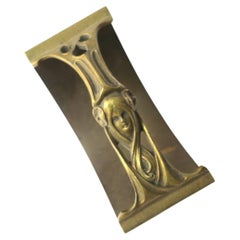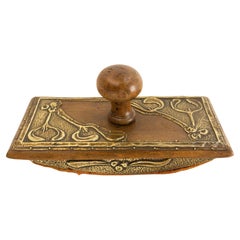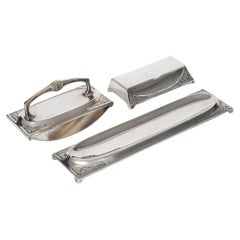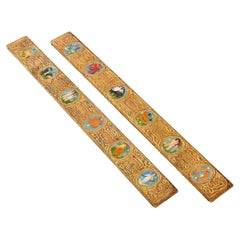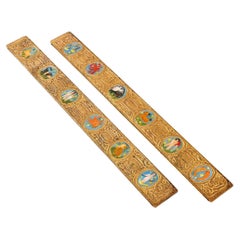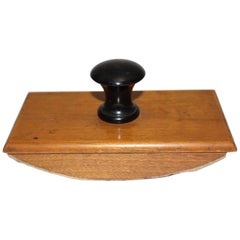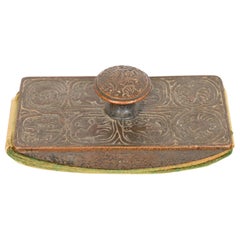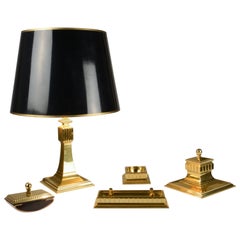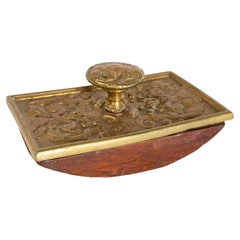Art Nouveau Desk Blotter
Early 20th Century European Art Nouveau Inkwells
Brass
Early 20th Century French Art Nouveau Desk Sets
Copper
Early 20th Century German Art Nouveau Desk Sets
Silver Plate
Early 20th Century American Art Nouveau Desk Sets
Bronze, Enamel
Early 20th Century American Art Nouveau Desk Sets
Bronze, Enamel
Early 20th Century Austrian Jugendstil More Desk Accessories
Wood
Early 20th Century American Art Nouveau Desk Sets
Bronze
Recent Sales
Early 20th Century Austrian Art Nouveau Desk Sets
Brass
Early 20th Century Austrian Inkwells
Brass
Early 20th Century American Art Nouveau Desk Sets
Bronze
Early 20th Century American Art Nouveau Desk Sets
Bronze
Antique Early 1900s American Art Nouveau More Desk Accessories
Bronze
Early 20th Century American Art Nouveau Desk Sets
Bronze
Early 20th Century American Art Nouveau Desk Sets
Bronze
Antique Late 19th Century Art Nouveau More Furniture and Collectibles
Brass
Antique Early 1900s American Art Nouveau Desk Sets
Bronze
Antique Early 1900s American Art Nouveau More Desk Accessories
Bronze
Vintage 1910s American Art Nouveau Desk Sets
Brass
Antique Early 1900s Scottish Art Nouveau More Desk Accessories
Brass
20th Century Desk Accessories
Silver
People Also Browsed
Early 20th Century European Art Nouveau Vases
Bronze
2010s Mexican Modern Platters and Serveware
Resin
Late 20th Century French Art Deco Desk Sets
Gold Plate
Vintage 1920s Hungarian Other Paintings
Canvas
20th Century English Arts and Crafts Wardrobes and Armoires
Wrought Iron
Early 20th Century Italian Art Nouveau Commodes and Chests of Drawers
Marble
21st Century and Contemporary French Art Deco Wall Lights and Sconces
Brass
Vintage 1940s French Art Deco Wall Lights and Sconces
Iron
2010s Italian More Dining and Entertaining
Marble
Early 20th Century French Floor Mirrors and Full-Length Mirrors
Mirror, Giltwood
Antique 18th Century English Neoclassical Console Tables
Alabaster, Marble, Gold Leaf
Antique Early 1800s English Georgian Beds and Bed Frames
Upholstery, Mahogany
Antique 1720s Spanish Baroque Beds and Bed Frames
Giltwood, Paint
Antique Late 19th Century Brazilian Romantic Chaise Longues
Wood
Vintage 1930s Hungarian Art Deco Commodes and Chests of Drawers
Walnut
Vintage 1920s French Art Deco Vases
Art Glass
Art Nouveau Desk Blotter For Sale on 1stDibs
How Much is a Art Nouveau Desk Blotter?
A Close Look at Art-nouveau Furniture
In its sinuous lines and flamboyant curves inspired by the natural world, antique Art Nouveau furniture reflects a desire for freedom from the stuffy social and artistic strictures of the Victorian era. The Art Nouveau movement developed in the decorative arts in France and Britain in the early 1880s and quickly became a dominant aesthetic style in Western Europe and the United States.
ORIGINS OF ART NOUVEAU FURNITURE DESIGN
- Emerged during the late 19th century
- Popularity of this modernizing style declined in the early 20th century
- Originated in France and Britain but variants materialized elsewhere
- Informed by Rococo, Pre-Raphaelite art, Japanese art (and Japonisme), Arts and Crafts; influenced modernism, Bauhaus
CHARACTERISTICS OF ART NOUVEAU FURNITURE DESIGN
- Sinuous, organic and flowing lines
- Forms that mimic flowers and plant life
- Decorative inlays and ornate carvings of natural-world motifs such as insects and animals
- Use of hardwoods such as oak, mahogany and rosewood
ART NOUVEAU FURNITURE DESIGNERS TO KNOW
ANTIQUE ART NOUVEAU FURNITURE ON 1STDIBS
Art Nouveau — which spanned furniture, architecture, jewelry and graphic design — can be easily identified by its lush, flowing forms suggested by flowers and plants, as well as the lissome tendrils of sea life. Although Art Deco and Art Nouveau were both in the forefront of turn-of-the-20th-century design, they are very different styles — Art Deco is marked by bold, geometric shapes while Art Nouveau incorporates dreamlike, floral motifs. The latter’s signature motif is the "whiplash" curve — a deep, narrow, dynamic parabola that appears as an element in everything from chair arms to cabinetry and mirror frames.
The visual vocabulary of Art Nouveau was particularly influenced by the soft colors and abstract images of nature seen in Japanese art prints, which arrived in large numbers in the West after open trade was forced upon Japan in the 1860s. Impressionist artists were moved by the artistic tradition of Japanese woodblock printmaking, and Japonisme — a term used to describe the appetite for Japanese art and culture in Europe at the time — greatly informed Art Nouveau.
The Art Nouveau style quickly reached a wide audience in Europe via advertising posters, book covers, illustrations and other work by such artists as Aubrey Beardsley, Henri de Toulouse-Lautrec and Alphonse Mucha. While all Art Nouveau designs share common formal elements, different countries and regions produced their own variants.
In Scotland, the architect Charles Rennie Mackintosh developed a singular, restrained look based on scale rather than ornament; a style best known from his narrow chairs with exceedingly tall backs, designed for Glasgow tea rooms. Meanwhile in France, Hector Guimard — whose iconic 1896 entry arches for the Paris Metro are still in use — and Louis Majorelle produced chairs, desks, bed frames and cabinets with sweeping lines and rich veneers.
The Art Nouveau movement was known as Jugendstil ("Youth Style") in Germany, and in Austria the designers of the Vienna Secession group — notably Koloman Moser, Josef Hoffmann and Joseph Maria Olbrich — produced a relatively austere iteration of the Art Nouveau style, which mixed curving and geometric elements.
Art Nouveau revitalized all of the applied arts. Ceramists such as Ernest Chaplet and Edmond Lachenal created new forms covered in novel and rediscovered glazes that produced thick, foam-like finishes. Bold vases, bowls and lighting designs in acid-etched and marquetry cameo glass by Émile Gallé and the Daum Freres appeared in France, while in New York the glass workshop-cum-laboratory of Louis Comfort Tiffany — the core of what eventually became a multimedia decorative-arts manufactory called Tiffany Studios — brought out buoyant pieces in opalescent favrile glass.
Jewelry design was revolutionized, as settings, for the first time, were emphasized as much as, or more than, gemstones. A favorite Art Nouveau jewelry motif was insects (think of Tiffany, in his famed Dragonflies glass lampshade).
Like a mayfly, Art Nouveau was short-lived. The sensuous, languorous style fell out of favor early in the 20th century, deemed perhaps too light and insubstantial for European tastes in the aftermath of World War I. But as the designs on 1stDibs demonstrate, Art Nouveau retains its power to fascinate and seduce.
There are ways to tastefully integrate a touch of Art Nouveau into even the most modern interior — browse an extraordinary collection of original antique Art Nouveau furniture on 1stDibs, which includes decorative objects, seating, tables, garden elements and more.
Finding the Right Desk-accessories for You
Whether you’ve carved out a space for a nifty home office or you prefer the morning commute, why not dress up your desk with antique and vintage desk accessories? To best tiptoe the line between desk efficiency and desk enjoyment, we suggest adding a touch of the past to your modern-day space.
Desks are a funny thing. Their basic premise has remained the same for quite literally centuries: a flat surface, oftentimes a drawer, and potentially a shelf or two. However, the contents that lay upon the desk? Well, the evolution has been drastic to say the least.
Thank the Victorians for the initial popularity of the paperweight. The Industrial Revolution offered the novel concept of leisure-time to Europeans, giving them more time to take part in the then crucial activity of letter writing. Decorative glass paperweight designs were all the rage, and during the mid-19th-century some of the most popular makers included the French companies of Baccarat, St. Louis and Clichy.
As paper was exceedingly expensive in the early to mid-19th-century, every effort was made to utilize a full sheet of it. Paper knives, which gave way to the modern letter opener, were helpful for cutting paper down to an appropriate size.
Books — those bound volumes of paper, you may recall — used to be common occurrences on desks of yore and where there were books there needed to be bookends. As a luxury item, bookend designs have run the gamut from incorporating ultra-luxurious materials (think marble and Murano glass) to being whimsical desk accompaniments (animal figurines were highly popular choices).
Though the inkwell’s extinction was ushered in by the advent of the ballpoint pen (itself quasi-obsolete at this point), there is still significant charm to be had from placing one of these bauble-like objets in a central spot on one’s desk. You may be surprised to discover the mood-boosting powers an antique — and purposefully empty — inkwell can provide.
The clamor for desk clocks arose as the Industrial Revolution transitioned labor from outdoors to indoors, and allowed for the mass-production of clock parts in factories. Naturally, elaborate designs soon followed and clocks could be found made by artisans and luxury houses like Cartier.
Find antique and vintage desk accessories today on 1stDibs.
